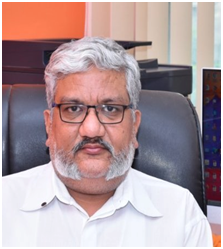- IIMT, Bhubaneswar is the first B-School in the country to start a "Lecture Note on Management"
- Admission Open for the PGDM Programme for the academic year 2023-24 | Contact details: 7381067748, 7381067752"
- PGDM in Data Science and Business Analytics
- Call 08069106128 for 24X7 Helpline for Women student, female faculty & female non-teaching faculty Rescue.
- Call 08069106129 for Psychological Counseling for mental health for students, faculty and non-teaching faculty.

Prof. Avinash Kumar Agarwal
Department of Mechanical Engineering, IIT Kanpur, Uttar Pradesh, India
Prof. Avinash Kumar Agarwal obtained his Undergraduate Degree in Mechanical Engineering (1994) from Malviya Regional Engineering College, Jaipur and his MTech (Energy, 1996) and PhD (Energy, 1999) from the Indian Institute of Technology (IIT) Delhi. After his Post-Doctoral Fellowship (1999 – 2001) at the ERC, UW, Madison, USA, he returned to India in 2001 and joined IIT Kanpur. He was a Visiting Professor at the University of Loughborough, UK; Photonics Institute, University of Vienna, Austria; Hanyang University and KAIST, South Korea. Prof. Agarwal is interested in research in IC engines, combustion, conventional and alternative fuels, Methanol/ DME/ Hydrogen/ HCNG fuelled engine development, LCA and TCO analyses, Fuel sprays, Lubricating oil tribology, optical diagnostics, laser ignition, HCCI, particulates and emission control, and large bore engines. He has developed laser-fired hydrogen and CNG engines in automotive sizes and developed the first electronic fuel injection system equipped with a locomotive engine for Indian Railways. Currently, Prof. Agarwal is developing Methanol and DME-fuelled engines/ vehicles for the automotive/ agricultural sectors. Prof. Agarwal has published over 510 peer-reviewed international journal and conference papers, 63 edited books, and 129 book chapters, attracting 15200+ Scopus and 23000+ Google Scholar citations. Prof. Agarwal is the Editor of 'FUEL', Editor-in-Chief of the "Journal of Energy and Environmental Sustainability, Associate Editor of the ASME Journal of Energy Resources Technology, ASME Open Journal of Engineering, International Journal of Vehicle Systems Modelling and Testing, and the Journal of the Institute of Engineers (Series C) and an editorial board member of IMechE International Journal of Engine Research. He edited Wiley VCH, Germany's "Handbook of Combustion" (5 Volumes; 3168 pages), the most updated combustion compilation globally. For his outstanding contributions, Prof. Agarwal is conferred upon Sir J C Bose National Fellowship (2019) by SERB, SAE India Foundation GURU Award (2022), WSSET Innovation Award-2022, Clarivate Analytics India Citation Award-2017 in Engineering and Technology, Prestigious Shanti Swarup Bhatnagar Prize (2016) in Engineering Sciences, Rajib Goyal Prize in Physical Sciences (2015); NASI-Reliance Industries Platinum Jubilee Award (2012); INAE Silver Jubilee Young Engineer Award (2012); Dr C. V. Raman Young Teachers Award (2011); SAE Ralph R. Teetor Educational Award (2008); INSA Young Scientist Award (2007); UICT Young Scientist Award (2007); INAE Young Engineer Award (2005); Devendra Shukla Research Fellowship (2009-12), Poonam and Prabhu Goyal Endowed Chair Professorship (2013-16), SBI Endowed Chair Professorship (2018-21, 2022-25) at IIT Kanpur; AICTE Career Award for Young Teachers (2004); DST Young Scientist Award (2002); and DST BOYSCAST Fellowship (2002), in addition to inaugural version of Distinguished Alumni Award-2021 by MNIT Jaipur and Distinguished Alumni Award-2022 by IIT Delhi. Prof. Agarwal is a highly cited researcher-2018 in and is among the top ten HCRs from India, among 4000 HCR researchers globally in 22 fields of enquiry. He is India's number one Energy researcher in the recently declared Stanford University listing of the top 2% of researchers globally. He is an elected Fellow of the Society of Automotive Engineers International, USA (SAE; 2012), American Society of Mechanical Engineers (ASME; 2013), Indian National Academy of Engineering (INAE; 2015), International Society for Energy, Environment and Sustainability (ISEES; 2016), Royal Society of Chemistry (RSC; 2018), National Academy of Science Allahabad (NASI; 2018), World Society of Sustainable Energy Technologies (WSSET-2020), American Association for Advancement in Science (AAAS; 2020) and Combustion Institute USA (CI; 2022). He is featured in the DST Golden Jubilee Coffee Table Book "75 under 50 Scientists Shaping Today's INDIA," released by Vigyan Prasar, Government of India, on National Science Day, February 28th, 2022.
